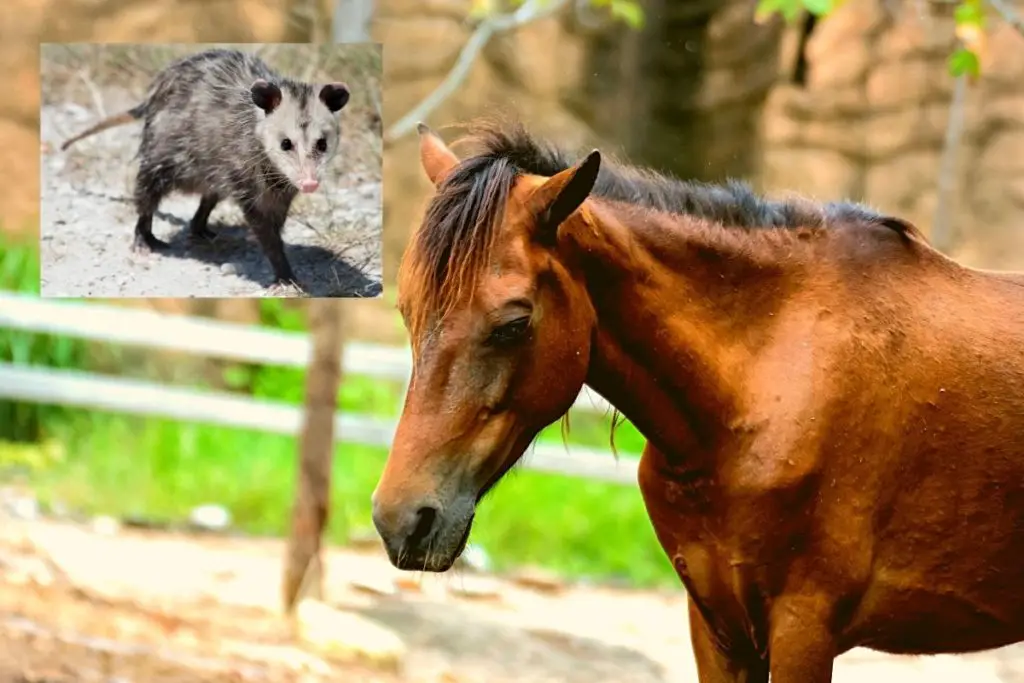Last Updated on March 22, 2022 by Cristina
EPM in horses is caused by what organism? Let’s find out everything we need to know about this serious horse disease!
What Is EPM? EPM In Horses Is Caused By What
The full name for EPM is Equine Protozoal Myeloencephalitis. EPM is a neurological disorder of horses and is widespread across North America.
This disease is caused by an organism found in the feces of the opossum. It is commonly spread when the feed supply of a horse becomes contaminated. The horse then ingests this organism and develops EPM.

Not all horses exposed to this organism will develop EPM, and some can carry it for months without displaying any symptoms. Horses under stress are more likely to develop clinical signs of EPM.
The incidence of EPM is much higher in areas with a high opossum population. However, as horse feed is transported from one region to another, it is possible for horses to contract EPM in areas with a low opossum population.
Click Here to Get Info About:
What Are The Symptoms Of EPM?
EPM can be difficult to diagnose, as the symptoms are very similar to many other neurological disorders. The symptoms of EPM can also be intermittent and inconsistent. The most common signs of EPM in horses include:
- Weakness and incoordination, especially when going up or down slopes or when the horse’s head is held in a raised position.
- An abnormal gait or lameness; commonly manifests as a stiff, stilted movement.
- Poor balance; the horse may stand with his legs splayed or lean against walls for support.
- Muscle loss along the back and hindquarters. In some cases, muscle wastage is also seen on the face and muscles of the forelegs.
- Loss of sensation on the body, neck, or face.
- Abnormal sweating patterns.
- Drooping of the lips, ears, or eyes.
- Collapse or seizures.
- Difficulty eating or swallowing.
- Head tilt.
Bute-Less Comfort & Recovery Supplement Pellets, Healthy Inflammatory Response
Remember that a horse with EPM may not show all of these symptoms, and they may not be present all the time. It can be useful to video your horse if he shows some unusual behavior or movement, to aid your veterinarian with the diagnosis.
Check Out How Do You Measure A Horse For A Blanket?
How Is EPM Diagnosed In Horses?
EPM is a very difficult disease to diagnose in horses. The clinical signs of EPM are also seen in many other neurological disorders. However, in EPM the symptoms tend to occur on one side or a specific part of the horse more than the other.
As with any neurological disorder, your veterinarian will carry out a full physical examination. He will then perform a neurological assessment, by observing your horse carrying out a range of movements. These might include:
- Applying downward pressure on the back and pelvis to see how the horse responds.
- Running a pen along the spine to test skin sensation.
- Encouraging the horse to bend his neck to the side and down.
- Placing the legs in a crossed position to see if the horse can rebalance himself.
- Pulling the tail to one side as the horse walks.
- Walking the horse in tight circles to observe his foot placement.
- Leading the horse up and down a slope with his head elevated.
- Walking the horse backward to see if he drags his toes.
If this examination leads the veterinarian to suspect that the horse has EPM, laboratory tests can be taken. There are three different tests for EPM
Serum Antibody Blood Test – EPM In Horses Is Caused By What
If a horse has antibodies to the organism that causes EPM, then it has been exposed to this disease at some point in its life. This does not confirm that the horse has the disease at that point in time. At least half the horse population will have a positive serum antibody test.
Read more about Navicular Disease In Horse Explained!
IgM Capture ELISA Blood Test
This test identifies antibodies found during an active EPM infection. A positive test indicates that the horse has the disease. However, this test is not widely performed and the sample will need to be shipped to a specialist laboratory.
Spinal Tap – EPM In Horses Is Caused By What
A spinal tap takes a sample of fluid from the horse’s spinal cord. This fluid is called cerebrospinal fluid. This is a better test to detect EPM infection but is an invasive procedure that can be risky for the horse.
Your veterinarian will discuss the options for diagnosing EPM with you, weighing up the advantages and disadvantages of each test. Once a positive diagnosis is confirmed, treatment will start straight away. It is important to make a fast diagnosis if EPM is suspected, as this will greatly increase the chances of a full recovery.

Summary – EPM In Horses Is Caused By What
So, as we have learned, EPM in horses is spread via an organism found in the feces of the opossum. When ingested, this organism causes neurological problems such as wobbling and loss of sensation. EPM in horses can be difficult to diagnose.
We’d love to hear your thoughts about EPM in horses is caused by what organism! Have you ever had a horse diagnosed with this disease? Or perhaps you need more information about how to prevent EPM in horses? Leave a comment below and we’ll get back to you!
FAQ’s
Is EPM Caused By Bacteria?
EPM is caused by a type of organism called a protazoa. This is similar to bacteria, but larger in size. Protozoa like to live in warm, damp places, and are commonly the causative agent of gastrointestinal disorders.
What Organism Causes EPM?
The organism that causes EPM is called Sarcocystis neurona. This is a protozoa found in the feces of opossum. Other species such as cats, skunks, and armadillo can also carry this protozoa, but cannot pass this disease directly to horses.
Can EPM In Horses Be Cured?
EPM in horses can be cured, but the sooner treatments starts the better the chance of a full recovery. With aggressive treatment, around 70 percent of horses with EPM make a full recovery. Treatment for EPM can take from one to six months.
How Do You Prevent EPM In Horses?
The best way to prevent EPM in horses is to reduce their exposure to the causative agent. To do this, horse feed should be kept in sealed containers. It may also be necessary to control the opossum population around your horse's accommodation.

